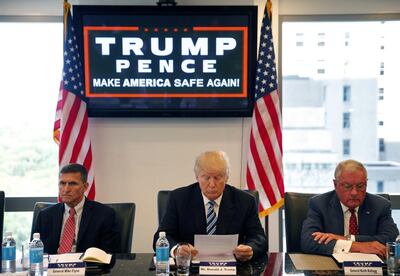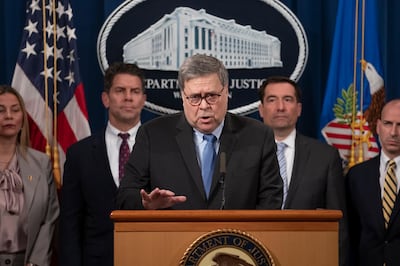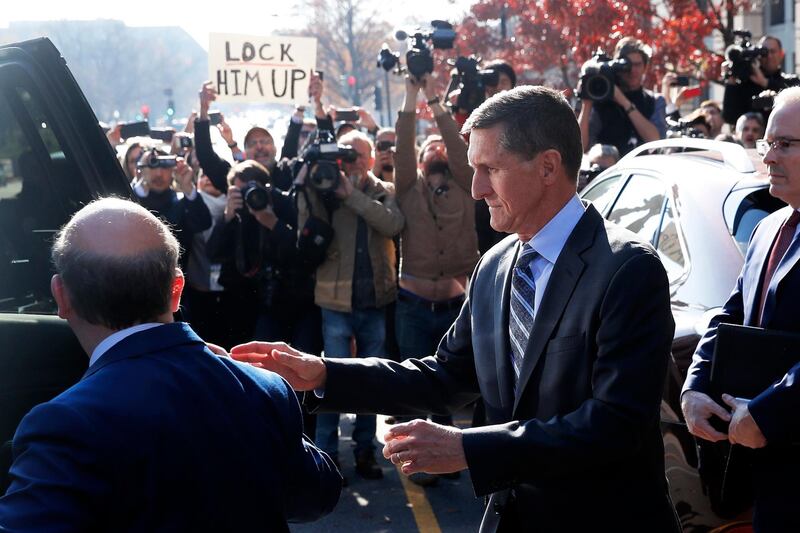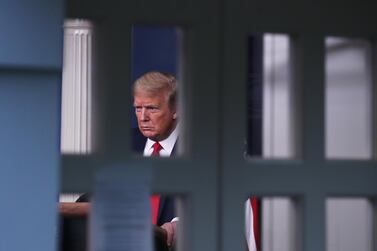Although most Americans are understandably focused on the coronavirus pandemic and consequent economic crisis, several intensifying controversies demonstrate how bitterly divided national politics remain. Take, for instance, the saga of Gen Michael Flynn who faces criminal charges for lying to the Federal Bureau of Investigation.
He grew close to Donald Trump during the 2016 presidential election campaign, and was one of his first appointees when named national security adviser on January 23, 2017. But by February 13, he was gone. Mr Trump said he reluctantly had to dismiss him for lying to Vice President Mike Pence and the FBI about a conversation he had with the then Russian ambassador Sergey Kislyak while Barack Obama was still president. Prosecutors say he also lied about lobbying on behalf of Turkey.
Yet, as Gen Flynn has faced criminal charges, Mr Trump has been thoroughly siding with him and strongly criticising his own prosecutors.
The case illustrates how irreconcilable Democratic and Republican worldviews have become, and how, even after more than three years in power, Mr Trump continues to position himself as a political outsider.
Democrats see an arrogant and lawless enabler of Mr Trump lying to everyone in sight, for reasons that remain suspiciously murky, about his conversations with the Russians. It sums up much of what they dislike and distrust most about Mr Trump, and their continued suspicions about unsavoury, and possibly illegal, Russian connections.

Republicans, however, see a patriotic, loyal Trump ally being ruthlessly persecuted by unelected, out-of-control bureaucrats who are ideologically opposed to Mr Trump and his "America First" agenda, and are willing to stop at nothing to bring down his administration. To them, this is just one of many scandalous and continuous "deep state" conspiracies against the President, especially the Robert Mueller investigation into the last election and his impeachment over dealings with Ukraine regarding the upcoming election.
The Democrats' perspective has been consistently reinforced by Gen Flynn's criminal prosecution, especially his guilty plea on felony charges of lying to the FBI. However, when prosecutors recommended a six-month sentence, he moved to withdraw his guilty plea, implying that the government had promised him more leniency. Sentencing has been indefinitely postponed, while Gen Flynn has been receiving increased support from Mr Trump and Attorney General William Barr.
Last week, his lawyers announced they had uncovered a "smoking gun" confirming their deep state conspiracy theory. A set of FBI documents, including working notes in preparation for their interview with Gen Flynn, were released. They include passages many Republicans insist demonstrate outrageous bias and vindicate his claims to have been framed by the police.

One handwritten note asks: “What is our goal? Truth/admission or to get him to lie, so we can prosecute him or get him fired?” Gen Flynn's supporters argue that this rhetorical question, which seems phrased in a way that can only be plausibly answered with the initial “truth” option, nonetheless demonstrates that he was "entrapped” by the authorities. But the document ultimately concludes that the FBI should be careful to “protect our institution by not playing games” with him.
An even deeper weakness with the "set up" story is that Gen Flynn was not a clueless naif or confused teenager. He is the former head of US military intelligence. He knew that the government routinely records telephone conversations of the Russian ambassador and that the FBI fully understood he was lying to other officials when he denied that the conversation was mainly about new sanctions by the Obama administration on Moscow – a possible violation of the Logan Act, a seldom-invoked law prohibiting private individuals from interfering with foreign policy.
Gen Flynn says he did not intentionally deceive Mr Pence, the FBI and others because he "forgot" the substance of this quite recent and highly sensitive phone call. But he could have simply said he did not remember, or that he would have to check the records, or even invoked his Fifth Amendment right to remain silent. Instead, he flatly denied they discussed what was, in fact, their main topic. Why he did that remains an open, and at least to Democrats, highly suggestive question.
The entire right-wing political ecosystem is up in arms over the revelations. Many conservatives, including Mr Trump's son Donald Jr, have even suggested the FBI agents in question should somehow be the ones facing prison.
Not only should general Flynn’s charges be dropped immediately but the treasonous actors who set him up should be in jail!!!
— Donald Trump Jr. (@DonaldJTrumpJr) April 29, 2020
Yet, there is no actual evidence that the FBI tried to induce or trick Gen Flynn into lying to them, or any reason to believe they could have done so even if they tried. Calling this "entrapment" may play well with a partisan Republican audience, but it is never going to fly in a court of law in which the issue will remain Gen Flynn's unlawful deceptions, not these (fundamentally normative rather than unusual) police tactics. One cannot, after all, “frame” a guilty defendant.
But what can happen is a presidential pardon from Mr Trump. In numerous tweets, he has been preparing the public for this, and the Republican response appears aimed at justifying it before the fact.
At a deeper level, this controversy – like increasingly heated arguments about social restrictions regarding the coronavirus – illustrates how Mr Trump tries to be both the head of government and the leader of the opposition simultaneously.
He issued national guidelines for social distancing, yet he has sided with angry and armed protesters who have denounced them. His own Justice Department is prosecuting Gen Flynn, while he indignantly complains about an appalling miscarriage of justice.
Time and again, Mr Trump reveals that he is fundamentally uncomfortable with responsibility and prefers condemning his own government, and even his own stated positions. It is a difficult two-step manoeuvre and underscores that he relishes campaigning far more than he does governing.
Mr Trump is seeking re-election as a political outsider while Democrats try to return him to the literal, and not just rhetorical, sidelines. At least until November, Mr Trump will continue to incongruously oscillate between the unprecedented "total authority" he often claims as President while simultaneously denouncing not just his opponents but his agencies, his officials and even some of his own policies.
Hussein Ibish is a senior resident scholar at the Arab Gulf States Institute in Washington






